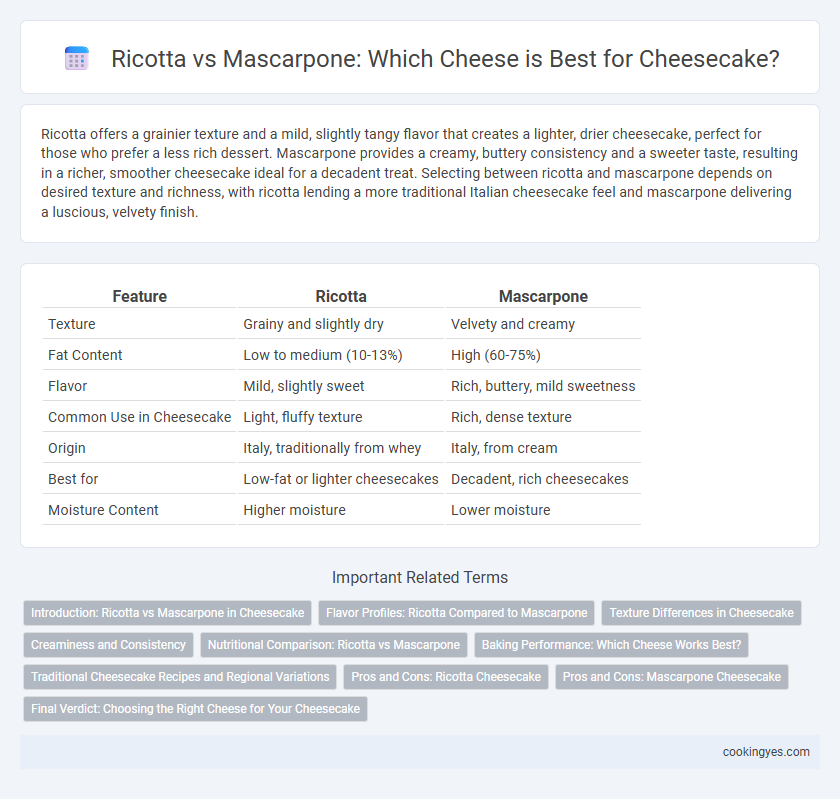Ricotta offers a grainier texture and a mild, slightly tangy flavor that creates a lighter, drier cheesecake, perfect for those who prefer a less rich dessert. Mascarpone provides a creamy, buttery consistency and a sweeter taste, resulting in a richer, smoother cheesecake ideal for a decadent treat. Selecting between ricotta and mascarpone depends on desired texture and richness, with ricotta lending a more traditional Italian cheesecake feel and mascarpone delivering a luscious, velvety finish.
Table of Comparison
| Feature | Ricotta | Mascarpone |
|---|---|---|
| Texture | Grainy and slightly dry | Velvety and creamy |
| Fat Content | Low to medium (10-13%) | High (60-75%) |
| Flavor | Mild, slightly sweet | Rich, buttery, mild sweetness |
| Common Use in Cheesecake | Light, fluffy texture | Rich, dense texture |
| Origin | Italy, traditionally from whey | Italy, from cream |
| Best for | Low-fat or lighter cheesecakes | Decadent, rich cheesecakes |
| Moisture Content | Higher moisture | Lower moisture |
Introduction: Ricotta vs Mascarpone in Cheesecake
Ricotta and mascarpone are two popular Italian cheeses commonly used in cheesecake recipes, each bringing distinct textures and flavors. Ricotta offers a grainy, lighter texture with a mild, slightly sweet taste, ideal for a crumbly and airy cheesecake. Mascarpone provides a rich, creamy consistency with a buttery flavor that creates a dense, smooth, and decadent dessert experience.
Flavor Profiles: Ricotta Compared to Mascarpone
Ricotta offers a mild, slightly grainy texture with a fresh, milky flavor that adds lightness and subtle tanginess to cheesecake, enhancing complexity without overwhelming sweetness. Mascarpone provides a rich, creamy texture with a buttery, sweet flavor that creates a smoother, more decadent cheesecake experience. Choosing between ricotta and mascarpone depends on the desired balance of creaminess and flavor intensity in the dessert.
Texture Differences in Cheesecake
Ricotta gives cheesecake a grainier, denser texture due to its dry, curd-like consistency, creating a rustic bite. Mascarpone offers a smoother, creamier texture with a rich, buttery mouthfeel, resulting in a velvety and luscious cheesecake. Texture differences significantly influence the final experience, with ricotta providing a firmer structure and mascarpone delivering silkiness.
Creaminess and Consistency
Ricotta cheese offers a grainy texture and slightly less creaminess, creating a firmer cheesecake with a mild flavor. Mascarpone provides a velvety, rich creaminess that results in a smoother, more decadent consistency. The choice between the two impacts the cheesecake's texture, with mascarpone preferred for ultra-creamy desserts and ricotta for a denser, slightly textured bite.
Nutritional Comparison: Ricotta vs Mascarpone
Ricotta cheese contains approximately 138 calories and 10 grams of protein per 100 grams, making it a nutrient-dense option for cheesecake with lower fat content and higher calcium levels compared to mascarpone. Mascarpone has around 435 calories and 4.6 grams of protein per 100 grams, offering a richer, creamier texture but significantly higher fat and calorie content. Choosing ricotta results in a lighter cheesecake with beneficial nutrients like vitamin A and potassium, whereas mascarpone enhances decadence with its saturated fat and creamy consistency.
Baking Performance: Which Cheese Works Best?
Ricotta and mascarpone differ significantly in baking performance for cheesecakes due to their moisture content and texture; ricotta is grainier and drier, resulting in a denser, crumbly cheesecake, while mascarpone's creamy texture creates a smooth, rich, and velvety consistency. Mascarpone melts evenly and retains moisture better, enhancing the cheesecake's creaminess and preventing it from becoming dry or cracked during baking. Ricotta-based cheesecakes benefit from added moisture or eggs to improve cohesion, but mascarpone remains the preferred choice for a classic, fudgy texture in baked cheesecakes.
Traditional Cheesecake Recipes and Regional Variations
Traditional cheesecake recipes often rely on ricotta or mascarpone to achieve distinct textures and flavors, with ricotta providing a lighter, grainier consistency common in Italian-style cheesecakes, especially in Sicily and Naples. Mascarpone, rich and creamy with a buttery taste, is favored in Northern Italian cheesecakes, giving the dessert a smooth, velvety texture characteristic of Piedmont and Lombardy regions. Regional variations influence the choice between ricotta and mascarpone, shaping the cheesecake's density, moisture content, and flavor profile within traditional culinary practices.
Pros and Cons: Ricotta Cheesecake
Ricotta cheesecake offers a light, grainier texture and slightly tangy flavor, which many prefer for a less sweet, more traditional Italian dessert. It is lower in fat than mascarpone, making it a healthier choice but sometimes less creamy and rich. Ricotta can result in a drier cheesecake if not properly balanced with eggs and sugar, demanding careful recipe adjustments for optimal moisture and smoothness.
Pros and Cons: Mascarpone Cheesecake
Mascarpone cheesecake offers a rich, creamy texture with a slightly sweet, buttery flavor, providing a luxurious alternative to traditional ricotta-based cheesecakes. Mascarpone's higher fat content results in a smoother, more velvety consistency but can make the dessert heavier and more calorie-dense. While ricotta cheesecakes tend to be lighter and less dense, mascarpone delivers a fuller mouthfeel that appeals to those seeking indulgence in every bite.
Final Verdict: Choosing the Right Cheese for Your Cheesecake
Ricotta offers a lighter, grainier texture with a mild tang that balances sweetness, making it ideal for a traditional Italian-style cheesecake. Mascarpone provides a rich, creamy consistency with a buttery flavor, perfect for dense, velvety American-style cheesecakes. Selecting between ricotta and mascarpone depends on the desired texture and flavor, with ricotta enhancing freshness and mascarpone delivering indulgence.
Ricotta vs Mascarpone for cheesecake Infographic

 cookingyes.com
cookingyes.com